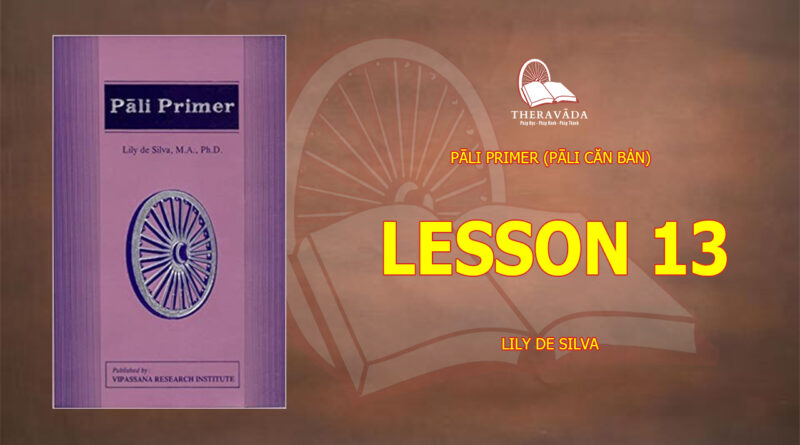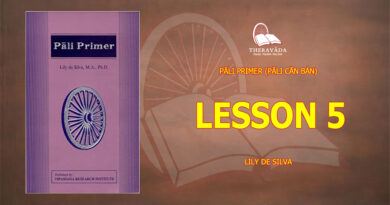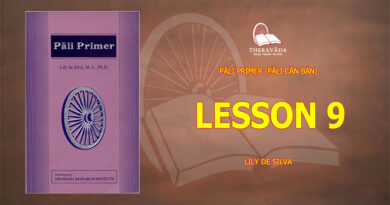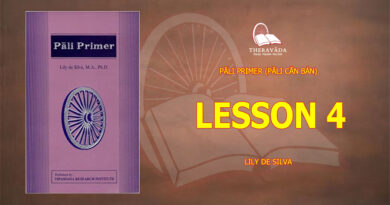Lesson 13
1. Conjugation of Verbs
The Present Tense, Active Voice (continued)
Verbs which have the base ending in -e are conjugated somewhat differently from what has been learnt so far. They can have two verbal bases, one ending in -e, the other ending in -aya, as in coreti and corayati.
Base: core = to steal
| Singular | Plural | |
| 3rd | (So) coreti | (Te) corenti |
| 2nd | (Tvaṃ) coresi | (Tumhe) coretha |
| 1st | (Ahaṃ) coremi | (Mayaṃ) corema |
Base: coraya = to steal
| Singular | Plural | |
| 3rd | (So) corayati | (Te) corayanti |
| 2nd | (Tvaṃ) corayasi | (Tumhe) corayatha |
| 1st | (Ahaṃ) corayāmi | (Mayaṃ) corayāma |
2. Some verbs similarly conjugated are as follows:
| deseti | preaches |
| cinteti | thinks |
| pūjeti | honours, offers |
| pūreti | fills |
| pīḷeti | oppresses |
| katheti | speaks |
| uḍḍeti | flies |
| udeti | (sun or moon) rises |
| ropeti | plants |
| manteti | discusses, takes counsel |
| āmanteti | addresses |
| nimanteti | invites |
| oloketi | looks at |
| jāleti | kindles |
| chādeti | covers |
| māreti | kills |
| neti | leads, takes away |
| āneti | brings |
| ṭhapeti | keeps |
| pāteti | fells |
| pāleti | rules, governs |
| parivajjeti | avoids |
| obhāseti | illuminates |
| deti (dadāti) | gives |
3. N.B. Gerunds / absolutives and infinitives from the above verbs are formed retaining the -e in the base.
Gerunds – desetvā, cintetvā, pūjetvā, pūretvā, etc.
Infinitives – desetuṃ, cintetuṃ, pūjetuṃ, pūretuṃ, etc.
4. Verbs which have the base ending in -nā are conjugated as follows:
Base: kiṇā = to buy
| Singular | Plural | |
| 3rd | (So) kiṇāti | (Te) kiṇanti |
| 2nd | (Tvaṃ) kiṇāsi | (Tumhe) kiṇātha |
| 1st | (Ahaṃ) kiṇāmi | (Mayaṃ) kiṇāma |
5. Some verbs similarly declined are as follows:
| vikkiṇāti | sells |
| suṇāti | hears |
| mināti | measures |
| gaṇhāti | takes |
| uggaṇhāti | learns |
| jānāti | knows |
| jināti | wins |
| pāpuṇāti / pappoti | reaches |
| ocināti | picks, collects |
| pahiṇāti | sends |
N.B. It should be observed that the present tense verbal terminations remain constant. Only the vikaraṇa suffix, or the conjugational sign in between the root and the termination, shows variation.
6. Attention should be paid to the following forms:
| Present Tense | Gerund / Absolutive | Infinitive |
| jānāti | ñatvā / jānitvā | ñātuṃ |
| suṇāti | sutvā / suṇitvā | sotuṃ / suṇituṃ |
| pāpuṇāti / pappoti | patvā / pāpuṇitvā | pāpuṇituṃ / pappotuṃ |
| gaṇhāti | gahetvā / gaṇhitvā | gahetuṃ / gaṇhituṃ |
7. The two verbs bhavati / hoti (to be) and karoti (to do) occur frequently in the language.
Their gerunds and infinitives are as follows:
| Gerund | bhavitvā / hutvā | katvā |
| Infinitive | bhavituṃ / hotuṃ | kātuṃ |
The verb atthi (to be) from root as and karoti (to do) from root kṛ are special verbs of frequent occurrence. They are conjugated as follows:
| Singular | Plural | |
| 3rd | atthi | santi |
| 2nd | asi | attha |
| 1st | asmi / amhi | asma / amha |
| 3rd | karoti | karonti |
| 2nd | karosi | karotha |
| 1st | karomi | karoma |
Exercise 13
8. Translate into English:
1. Buddho vihārasmiṃ sannipatantānaṃ manussānaṃ dhammaṃ deseti.
2. Buddhassa pūjetuṃ cintento upāsako pupphāni ocināti.
3. Te patte udakena pūrentā gītaṃ gāyanti.
4. Tumhe araññe vasante mige pīḷetvā asappurisā hotha.
5. Mayaṃ āpaṇaṃ gantvā vāṇijehi saddhiṃ kathetvā dhaññaṃ vikkiṇāma.
6. Tvaṃ uḍḍentaṃ sukaṃ disvā gaṇhituṃ icchasi.
7. Pabbatamhā udentaṃ candaṃ passituṃ kumāro gharamhā dhāvati.
8. Ahaṃ kassakehi saha khettasmiṃ rukkhe ropemi.
9. Mayaṃ amaccehi saha mantentā pāsādasmiṃ āsanesu nisīdāma.
10. Tumhe Tathāgatassa sāvake nimantetvā dānaṃ detha.
11. Upāsakā vihāraṃ gantvā dīpe jāletvā dhammaṃ sotuṃ nisīdanti.
12. Luddako sīsaṃ (head) dussena chādetvā nisīditvā sakuṇe maretuṃ ussahati.
13. So vane āhiṇḍante goṇe gāmaṃ ānetvā vāṇijānaṃ vikkiṇāti.
14. Tvaṃ āpaṇehi bhaṇḍāni kiṇitvā sakaṭena ānetvā gehe ṭhapesi.
15. Tumhe kakacehi rukkhe chinditvā pabbatamhā pātetha.
16. Dhammena manusse pālentā bhūpālā akusalaṃ parivajjenti.
17. Saccaṃ ñātuṃ icchanto ahaṃ samaṇehi pañhe pucchāmi.
18. Dānaṃ datvā sīlaṃ rakkhantā sappurisā saggalokaṃ pāpuṇanti.
19. Dhaññaṃ minanto kassako āpaṇaṃ netvā dhaññaṃ vikkiṇituṃ cinteti.
20. Ahaṃ pattena pānīyaṃ pivanto dvārasmiṃ ṭhatvā maggaṃ olokemi.
21. So āpaṇamhā khīraṃ kiṇituṃ puttaṃ pahiṇāti.
22. Mayaṃ dhammaṃ uggaṇhituṃ ussahantā paṇḍitena saha mantema.
23. Corehi saddhiṃ gehe bhinditvā manusse pīḷentā tumhe asappurisā hotha.
24. Ahaṃ suvaṇṇaṃ pariyesamāne dīpamhā āgacchante vāṇije jānāmi.
25. Ahaṃ ācariyo homi, tvaṃ vejjo hosi.
26. Tvaṃ asappurisa, Buddhena desentaṃ dhammaṃ sutvā sappuriso bhavituṃ ussahasi.
27. Ahaṃ paṇḍitehi saddhiṃ mantento dhammena dīpaṃ pālento bhūpālo asmi.
28. Varāhe mārentā corā kassake pīḷentā pāpakammāni karonti.
29. Sīlaṃ rakkhantā puññakammāni karontā manussā saggaṃ pappotuṃ ākaṅkhanti.
30. Akusalaṃ pahāya pāpaṃ parivajjetvā viharantā narā sappurisā bhavanti.
9. Translate into Pāli:
1. Having picked fruits from the trees you send (them) to the market.
2. Having heard the Buddha preach the doctrine I become glad.
3. Thinking of collecting corn I go to the field with the farmer.
4. Singing songs you (pl.) look at the birds flying in the sky.
5. I advise the wicked man who oppresses the farmers in the village.
6. We dig pits to plant trees in the park.
7. We know the man who is lighting lamps in the monastery.
8. You (pl.) cross the sea with sailors to reach the island.
9. The king governing the island wins.
10. We begin to learn the dhamma from recluses living in the village.
11. Searching for the truth the wise man goes from city to city.
12. Avoiding the sleeping dog with his foot the child runs home.
13. Wishing to be born in heaven wise men fear to do evil.
14. Departing from the human world wicked men are born in hell (narake).
15. Having invited the hermit from the mountain the king gives him a robe.
16.Trying to understand the truth lay devotees become recluses.
17. Expecting to hear the monk preaching the dhamma lay devotees assemble in the monastery.
18. We see with our eyes, hear with our ears (sotehi), touch with our bodies.
19. I am the king governing the islands.
20. You (pl.) are wicked men who take counsel with thieves.
21. Good men begin to plant trees to protect the world.
22. Having heard the dhamma, the thief wishes to avoid evil.
23. Merchants keep clothes in shops to sell (them) to farmers coming from the villages.
24. The sick man (gilāna) is a messenger of the gods in the human world.
25. There are good men in the world who admonish wicked men.
26. Having picked lotuses from the water, the doctor goes to the monastery to listen to the dhamma.
27. Seeing the Buddha and being pleased the thief throws away the arrows.
28. Wishing to avoid evil I practise virtue.
29. We cook rice to give alms to the monks coming from the monastery.
30. You (pl.) go from island to island searching for gold with merchants.
-ooOoo-







